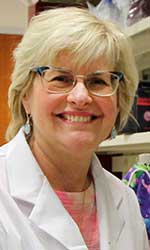Two decades ago, Catherine Field’s University of Alberta nutrition lab showed that specific fatty acids in breast milk during the crucial first period of life could program how the immune system responds to food allergens.

Catherine Field
Her group looked at milk, egg and soy allergies – the ones babies tend to grow out of but can still cause real issues – and determined that the fatty acid DHA, found most commonly in seafood, was instrumental in suppressing not only these early allergies but also other diseases like asthma and emphysema.
It was that work that led to DHA being added to infant formulas across North America.
“Immunology is in the centre of virtually every chronic disease,” said Field, a researcher in the Faculty of Agricultural, Life & Environmental Sciences (ALES) and Canada Research Chair in Human Nutrition and Metabolism.
“Now we’re spending a lot more time answering the question: Exactly how does nutrition influence the immune system?”
Now, thanks to $420,000 from the federal government’s John R. Evans Leaders Fund (JELF) and matching funds from the government of Alberta, Field, along with immunology researchers Caroline Richard from the Faculty of ALES and Sue Tsai from the Faculty of Medicine & Dentistry, will be able to purchase the equipment to determine the mechanism behind the impact of diet on immunity. The grant is part of $4.8 million in foundational research infrastructure for 23 U of A projects.
Richard, who holds the Canada Research Chair in Nutritional Immunology, and Tsai, the Canada Research Chair in Immunometabolism, will focus their efforts more on the inflammation in obesity and how it’s so related to all of the complications of obesity.
“My co-principal investigators are interested in how they could modify that inflammation through nutrition, or finding markers that could be targeted in different ways, whether it’s by nutrition or by pharmaceuticals,” said Field.
Although Field was alone in this area of research, she said it’s slowly gaining in popularity as supplements with immune-boosting claims are now a multibillion-dollar industry.
“The U of A is the only place in the country that has people doing work on nutritional immunology and metabolism,” she said.
“We’re actually really looking for interventions that we could put into either clinical guidelines or policies.”
For instance, there are really no recommendations for moms focused on immune development for babies, Field said.
She also said allergies seem to be growing, whether we’re just getting better at diagnosing them or there really are more allergies.
“It’s a happy story that we’re trying new things and understanding how they work so that we can get these into recommendations for the public.”
| By Michael Brown
This article was submitted by the University of Alberta, a Troy Media Editorial Content Provider Partner.
The opinions expressed by our columnists and contributors are theirs alone and do not inherently or expressly reflect the views of our publication.
Troy Media
Troy Media is an editorial content provider to media outlets and its own hosted community news outlets across Canada.


